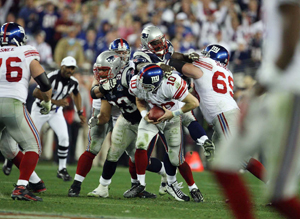Whistle blower
Examining sports through a Freakonomics lens, economist Tobias J. Moskowitz makes some controversial calls.
By Jason Kelly
Photography by Behrouz Mehri/AFP/Getty Images/Newscom

Referee Mike Carey’s grasp of the situation gave Eli Manning a chance to make magic happen.
New England Patriots defender Jarvis Green wrapped an arm around Eli Manning’s waist, jerked his collar, and stretched his jersey, but he could not bring down the New York Giants quarterback. Somehow Manning managed to escape Green’s grip—except that Manning didn’t escape, not by the typical interpretation of the NFL rule book.
Rather than calling Manning “in the grasp”—a common ruling to stop a play by calling a quarterback down before he is tackled—in the final minute of the 2008 Super Bowl, referee Mike Carey let the play continue. It became an iconic moment.
Manning heaved a pass to wide receiver David Tyree, who pinned the ball to his helmet and held on as he fell to the ground. Four plays later the Giants scored the game-winning touchdown to upset the previously unbeaten Patriots.
Steve Sabol, president of NFL Films, called Manning-to-Tyree “the greatest play in Super Bowl history.” But it never would have happened had Carey enforced the rule the way referees often do in less-important situations. In Scorecasting: The Hidden Influences Behind How Sports Are Played and Games Are Won (Crown Archetype, 2011), coauthors Tobias J. Moskowitz and L. Jon Wertheim argue that, in letting the play continue, Carey exhibited an omission bias common to sports officials.
The bias is nothing insidious—the authors consider referees “upstanding professionals.” Rather, it’s a reflection of what fans and leagues expect of them: to avoid insinuating themselves into games. “What we should really want is for games to be officiated without bias,” they write. “Yet that’s not the case.”
Moskowitz, the Fama Family professor of finance at Chicago Booth, and Wertheim, a Sports Illustrated senior writer, have harbored unorthodox sports opinions since they were 12-year-old bunkmates at Camp Young Judaea in 1984. Their softball team put its worst player at catcher instead of the traditional relegation to right field, limiting his defensive liability. As Scorecasting reports, “Bunk Seven didn’t lose another softball game the rest of the summer.”
Now the childhood friends have combined contrarian instincts with professional expertise to write the sports equivalent of Freakonomics, Chicago economist Steven Levitt’s 2005 bestseller. “I’d always had these questions,” Moskowitz says in his Harper Center office, the Yahoo! Sports home page open on his computer. “Like, does defense really win championships? All these things that are uttered on TV that drive me crazy.” In fact, according to his research, defense does not necessarily win championships. Across sports, great offenses lead teams to titles just as often.
Other Scorecasting conclusions also run counter to persistent impressions. Teams often use a strategy called icing—trying to freeze an opponent with a timeout before a free throw or field goal. It doesn’t work. The authors found almost identical results among kickers and free-throw shooters who were iced and those who were not.
Whether a player is cold or hot, momentum, the authors say, is a myth. Good or bad streaks often occur, but Moskowitz and Wertheim insist that “the real question is whether those streaks predict future performance.” Their answer is no, which Moskowitz says has been the most difficult notion for Scorecasting readers to accept.
Psychologist Amos Tversky and others first refuted the idea of momentum in a 1985 paper, arguing that there’s no such thing as a “hot hand” in basketball—that is, making several consecutive shots does not mean a player’s next attempt is more likely to be successful. But no matter how statistically dubious, the concept of momentum remains emotionally ingrained. “No one wants to believe that,” Moskowitz says, including himself. “At some level, I believe it exists. It’s just that you don’t find evidence of it in the data.”
There is evidence for home-field advantage in every sport they studied, but it’s officials, not players, who most influence that stat. Team performance, the authors found, remains consistent at home and away. Referee errors and subjective calls, on the other hand, tend to favor the home team, which the authors attribute to a psychological response to pressure from the crowd.
Pressure also helps explain an overall drop in judgment calls—such as “in the grasp” in football—late in games, when officials feel the greatest burden not to influence the final score. For withholding the whistle on that defining Super Bowl play, the authors note, Carey “was widely hailed for his restraint, so much so that he was given a grade of A+ by his superiors.”
An official’s situational sense of when not to interfere is known as “swallowing the whistle,” an omission bias that Mosko-witz and Wertheim found in football, basketball, baseball, hockey, and international soccer. Major League Baseball, for example, instituted pitch-tracking technology in 2007. Accurate to within a centimeter, it measures umpires’ precision—or lack thereof—in calling balls and strikes. On average umpires make incorrect calls on only about 14 percent of pitches. Those mistakes increase significantly, the authors say, when a pitch should be called ball four (incorrect 20 percent of the time) or strike three (wrong 39 percent of the time): “Rather than issue a walk or strikeout, umpires seem to want to prolong the at bat and let the players determine the outcome.”
Removing themselves—even if it means making an incorrect call—appears to be the best way for officials to avoid controversy. Moskowitz and Wertheim, on the other hand, invite debate with every statistic that contradicts entrenched truisms such as “defense wins championships.”
As psychologist Tversky said about his momentum research: “I’ve been in a thousand arguments over this topic. I’ve won them all, and I’ve convinced no one.”
Return to top
